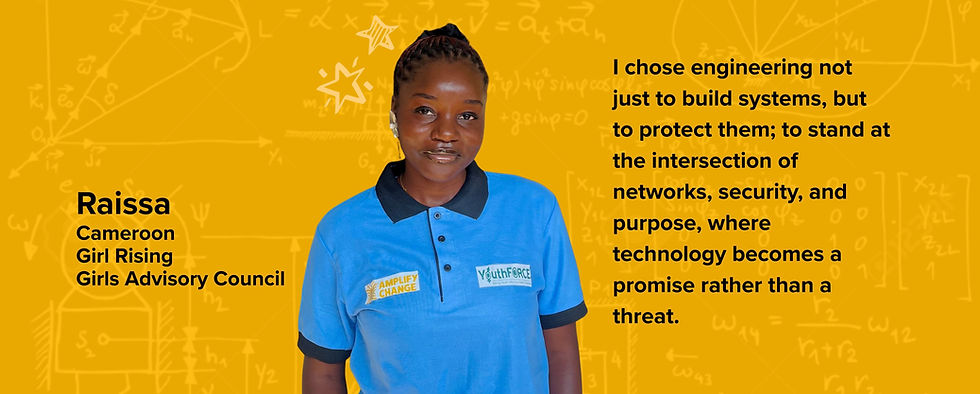Kaavish Project’s Field Coordinator Highlights the Importance of Male Allies
- Aug 17, 2023
- 4 min read

Sarwech Mujahid is the Field Coordinator for the Kaavish Project in Pakistan, which in partnership with Together Women Rise works in areas where girls' rights are most impacted and provides adolescents, educators, parents, and community members with the resources, training, and skills to advocate for equitable, quality education. Recently, he sat down with Girl Rising and shared his experiences leading a gender equity movement in his home country, Pakistan.
How did you get involved with Girl Rising programming?
Answer: My journey with Girl Rising Programming has started when I was serving as an intern teacher, at Sindh Education Foundation (SEF) at Government Girls Model High School, Shaheed Banazir Bhutto, Khairpur Mir’s, where I conducted Girl Rising gender equity training sessions with two groups batches of students.
What is your favorite part of working with young people?
Answer: In my opinion, if we provide young people with the necessary abilities, they will flourish and apply such skills in their daily life. I recently paid a visit to my students from the previous group in Girl Rising programming, and I was thrilled to see that they still remembered all the stories and major concepts that we had covered two years prior. So, in essence, I adore their willingness to grow and learn new things in life.
Why do you believe girls' education is important?
Answer: I believe girls’ education is important because providing girls with access to education empowers them and helps them to bridge the gender gap. Girls who receive proper education are better able to think critically, make thoughtful decisions, and exert more control over their lives. It can also encourage equality between men and women to challenge traditional gender roles.
Why should the people of Pakistan particularly prioritize girls' rights and education?
Answer: Genuinely I presume that gender discrimination still exists in many parts of Pakistan, particularly, in some rural areas of Sindh and Baluchistan with girls often facing barriers to accessing basic rights and opportunities. By prioritizing girls’ rights and education, our country can work towards creating a more equal society where everyone has an equal chance to succeed. I have personally witnessed instances where young girls are being married off despite their desire to pursue education in my district. The practice of forced early marriage persists due to deep-rooted cultural norms that have prevailed in the community for centuries. It is crucial to intervene and address these harmful social norms so that girls can also achieve their dreams.
I have also observed that many mothers express regrets about not receiving an education themselves or not being allowed to attend school by their parents. They mentioned that financial constraints and societal norms were the major barriers holding them from reaching their full potential.
The 2022 floods were also devastating, where people suffered immensely due to the lack of skills and education. Loss of livelihoods, such as livestock and other means of sustenance, made it extremely challenging for the affected communities to cope with the situation. In such disasters or conflicts, I believe that girls and women bear a heavier burden, which further exacerbates their struggles.
Why is it particularly important for men to speak up about girls' rights?
Answer: Men can play a vital role in breaking down harmful stereotypes and challenging social norms that perpetuate gender inequality. Men can use their privilege and influence to amplify the voices of girls and women. They can advocate their rights and enact positive change in policies. In a nutshell, men who actively support girls’ rights can build strong alliances and partnerships with women, fostering a collaborative and inclusive approach toward gender equality.
What about your own personal life experiences inspired you to be involved in the work Girl Rising does?
Answer: Growing up I have seen the role of my mother in our lives. She was one of only a few only few females educated in my community. The way she used to guide other women, the role she played in our intellectual development is something that has inspired me to work for women empowerment. I remembered that she had been working as a headmistress in a private hall located in our forefathers’ house, then she asked my father to donate a plot to the government near our home and constructed a primary school for girls. I am now an educated, published author ready to publish my second book, which is a novel based on self-reflection. It all has been possible due to the guidance of my mother who is also headmistress at a government school in my village.

What is your dream for the girls of Pakistan?
Answer: My dream for the girls of Pakistan is that from a young age, they get an environment where they would be able to discuss their aspirations, and then they get opportunities to achieve their dreams. I have noticed my students’ happy faces when they discuss their dreams, role models, their strength, and future goals. I want concerned government leaders, parents, and community members to prioritize girls’ education in their own circles. I strongly believe no one should construct any excuse or give any reason to not send their daughters to school.
What is the one thing you wish to tell all the people of the world, particularly men?
Answer: One thing that I wish to tell all the people of the world about girls is that they are capable, resilient, and deserving of equal opportunities. Girls have immense potential and their tangible contributions should be celebrated and valued. Let us all join hands in empowering and uplifting girls, giving them the tools and platforms they need to thrive and fulfill their dreams. Together, by embracing gender equality, we can ensure that every girl has the chance to reach her fullest potential and achieve greatness.




Comments